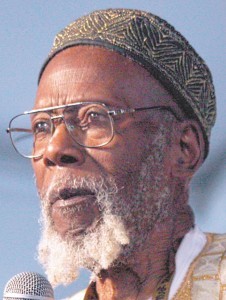Music icon and educator, Harold Battiste dies at age 83
29th June 2015 · 0 Comments
By Geraldine Wyckoff
Contributing Writer
“Keeping the music alive” remained the core of Harold Battiste’s philosophical outlook on life and manifested itself in all of his endeavors as a musician, arranger, producer, composer, writer, record label owner and educator. Serene in nature, Battiste was ambitious when it came to forwarding New Orleans music, including founding A.F.O. Records (All For One), the first musician-owned label in the city. Harold Battiste, a gentle colossus on this city’s music scene, died on Friday, June 19, 2015, at the age of 83.
Battiste began his musical journey playing clarinet though the saxophone became his main ax. He attended the Gilbert Academy, Booker T. Washington High School and graduated from Dillard University with a degree in music education. He then taught high school with teaching being a profession he would return to decades later as a professor in the University of New Orleans’ jazz studies program.
Battiste once smilingly acknowledged that in his position at UNO, where he taught from 1998 until he retired in 2006, his image to some of his students was that of a compassionate uncle.
“He was one of the only professors who you could go to and just talk to and it didn’t have to be about music or the university,” says pianist Jesse McBride who calls Battiste his guru and has carried out his mentor’s musical concepts. “I just started hanging out in the office and he never kicked me out.”
As a young man, teaching was Battiste’s day job and gigging on R&B shows with the likes of the Johnson Brothers Combo — saxophonist Plas Johnson and pianist Ray Johnson — and vocalist Joe Jones. But jazz was, and continued to be throughout his life, on Battiste’s mind. As he once told it, “I was a young cat thinking about (modern jazz saxophonist) Charlie Parker.” That led to he, pianist Ellis Marsalis and drummer Ed Blackwell heading to Los Angeles to meet for a session with the innovative alto saxist Ornette Coleman.
California would call Battiste again and he headed for the west coast in 1963. There he gained further recognition in the music industry as the musical director of the popular television program, “The Sonny & Cher Show.” “It allowed me to do things I thought I never could do,” Battiste once remembered. “It allowed me to do motion pictures and it opened doors for me.”
The doors at Battiste’s California home were also always open when New Orleans musicians would come to town. It became a gathering spot — a place for new arrivals to get advice and feel at home.
It was in L.A. that Battiste produced three albums — Gris-Gris, Babylon and Gumbo — that transformed fellow New Orleanian piano player and singer Mac Rebennack to Dr. John. “The Dr. John work allowed me to walk back into the thing that I loved — New Orleans,” Battiste said.
Battiste’s accomplishments span the musical horizon from writing the arrangements for Sam Cooke’s 1957 chart-topper “You Send Me,” producing vocalist Lee Dorsey’s 1961’s hit “Ya Ya,” to acting as a talent scout for Specialty Records. He also published his sheet music/workbook, The Silverbook, of which he was rightfully proud as its aim was keeping the works of New Orleans composers alive for and through another generation. The words “The Future of Our Past” printed with little fanfare on the upper right cover of the book speaks volumes about Battiste’s philosophy. He also wrote his detailed autobiography, Unfinished Blues… Memoirs of a New Orleans Music Man.
Documentation of New Orleans music was always of the utmost importance to Battiste in order “to expose the world to the musicians who were continuing the tradition of creativity that had started nearly a century ago in this city.”
To assure this city’s music’s place in history was one of his reasons for establishing the A.F.O. Records that captured artists on the modern jazz scene like pianist Ellis Marsalis and drummer Ed Blackwell as well as producing several hot rhythm and blues singles including Barbara George’s hit “I Know.”
One of Marsalis’ first moves, after becoming the director of the Coca Cola Endowed Chair of UNO’s jazz studies program in 1989, was to call Battiste and ask for his assistance in developing the new curriculum. Though Battiste had long enjoyed a successful career in California, he flew right back home to take the job.
Being back in New Orleans offered Battiste the opportunity to resurrect the A.F.O. Records label. His aim was to release and re-release previously recorded albums such as drummer Ed Blackwell’s Boogie Live…1958 that didn’t see the light of day until 1992. He also wanted the label to be available to document the young players coming up. He dubbed the project, Harold Battiste Presents the Next Generation and his protegé, Jesse McBride carries out Battiste’s concept by using the title the Next Generation for his band. Its repertoire is filled with material penned by this city’s modern jazz fathers including Battiste, Marsalis, drummer James Black and clarinetist Alvin Batiste.
Battiste was a man of vision — a man of remembering yesterday, being here today and looking towards tomorrow.
One thing about Harold Battiste — he did some serious hanging on the music scene. That too was all a part of “keeping the music alive.”
A music tribute for Harold Battiste was presented last Wednesday, June 24, at the Prime Example led by Jesse McBride Presents the Next Generation. Funeral services were conducted on Thursday, June 25, at the Christian Unity Baptist Church.
This article originally published in the June 29, 2015 print edition of The Louisiana Weekly newspaper.




